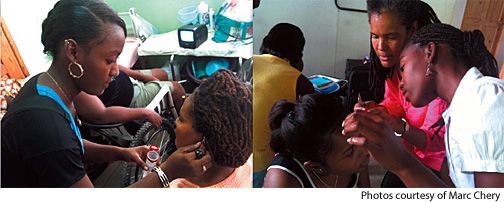The most important relationship I seek to nurture in the treatment room is the one a patient has with their own body. We live in a culture that teaches us to override pain, defer to outside authority, and push through discomfort. Patients often arrive hoping I can “fix” them, but the truth is, we can’t do the work for them. We can offer guidance, insight and support, but healing requires their full participation.
Haiti: One Year Later, Acupuncturists Return
A year after a 7.0-magnitude earthquake devastated Haiti, Acupuncturists Without Borders (AWB) has coordinated efforts to return to the impoverished country to assist in the ongoing recovery and provide further training in trauma recovery treatment for 30-40 Haitian healthcare providers.
The Albuquerque, N.M.-based nonprofit organization will arrive in Haiti this spring with the help of a $20,000 grant from the Unitarian Universalist Service Committee.
AWB executive director Diana Fried said the level of physical and mental/emotional trauma throughout the country is at an all-time high since the Jan. 12, 2010 quake and the people of Haiti still need support for sustained trauma.
"When people are traumatized they often can't sleep, digest food properly, think, and sometimes even speak. Their nervous systems become stuck in a state of fight or flight," Fried said. "Symptoms of mental health problems may become more pronounced, such as uncontrollable rage, catatonic depression, and psychosis. Because of this, it's virtually impossible for a person to begin rebuilding a life or a country when their immediate experience is one of profound trauma."
Last year, the organization along with Pathways to Wellness had mobilized teams of volunteer acupuncturists in Haiti to provide assistance after the quake killed an estimated 200,000 people and injured thousands more.
Both organizations were able to assist by providing more than 4,500 trauma recovery treatments for post-traumatic stress disorder and pain management. Survivors and rescue workers were treated with five, tiny, disposable needles in the outside of each ear, re-setting the nervous system to initiate the process of trauma recovery.
During this trip, the organization is hoping to provide additional training for the same trauma recovery treatment in order to help more people improve their health and receive support from the local healthcare providers.
AWB's first training for 30 Haitian healthcare providers took place in Port-au-Prince last August. Since that time the trainees have requested more support in mastering the techniques and launching their treatment efforts around the country.
"Even though the method is very simple, it helps to practice it for a while after you are trained, and then be able to ask questions and receive feedback from a trainer," Fried said. "That's what we'll go back and do - so that every single trainee feels fully confident in using these techniques. With that confidence, they can treat hundreds of thousands of people a year in Haiti - more than we could ever treat by coming in from the U.S. for short periods of time."
Fried noted prior to this devastating earthquake in 2010, Haiti was struggling as a result of many previous disasters and political/economic challenges, and was already the poorest country in the Western Hemisphere with 80 percent of the population living under the poverty line and 54 percent living in abject poverty.
Over the past several years, the nonprofit organization has responded to a number of natural disaster situations, including following Hurricane Katrina in New Orleans and the Gulf Coast, in California following the wildfires, and in Iowa following the floods in 2008. AWB has also implemented a program to provide military veterans with acupuncture treatments to aid with recovery from post-traumatic stress disorder.
To learn how to get involved or to make a donation, visit www.acwb.info.



